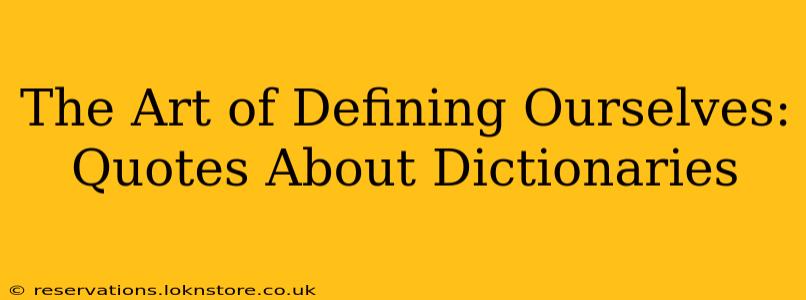The Art of Defining Ourselves: Quotes About Dictionaries
Dictionaries. Those seemingly simple volumes hold within their pages a universe of words, each a tiny window into the vast landscape of human experience. But dictionaries are more than just repositories of definitions; they are reflections of our culture, our history, and our ever-evolving understanding of the world. Through the lens of insightful quotes, we can explore the profound impact dictionaries have on how we perceive language and, ultimately, ourselves.
The power of a dictionary lies not just in its ability to clarify meaning, but also in its potential to inspire, challenge, and even shape our understanding of the world around us. This exploration delves into the multifaceted nature of dictionaries, examining their significance beyond simple word definitions.
What makes a good dictionary?
A good dictionary is far more than a simple list of words and their meanings. It's a carefully curated reflection of a language's evolution, incorporating etymology, usage examples, and often, cultural context. A truly excellent dictionary reflects the nuances of language, acknowledging variations in meaning and usage across different regions and communities. It should be accessible to a wide range of readers, while maintaining scholarly rigor and accuracy. Furthermore, a good dictionary is regularly updated to reflect the dynamic nature of language itself, incorporating new words and evolving definitions. This constant evolution keeps the dictionary relevant and representative of the current linguistic landscape.
How are dictionaries made?
The creation of a dictionary is a monumental task, requiring the collaboration of numerous lexicographers, linguists, and editors. This process involves meticulously collecting and analyzing vast quantities of textual data, identifying word usage patterns, and meticulously crafting definitions that accurately reflect the diverse meanings of each word. This careful attention to detail is crucial in ensuring the accuracy and reliability of the dictionary as a source of linguistic information. The process often involves several stages of review and revision, ensuring that the final product meets the highest standards of linguistic accuracy and clarity.
What is the history of dictionaries?
Dictionaries have a rich and fascinating history, evolving alongside the languages they represent. Early dictionaries were often modest in scope, focusing on clarifying the meanings of obscure or unfamiliar words. Over time, dictionaries have grown increasingly comprehensive, incorporating detailed etymologies, usage examples, and cultural context. The development of dictionaries has mirrored the evolution of linguistic understanding, reflecting changes in societal values, technological advancements, and evolving cultural norms. Tracking the history of dictionaries provides a fascinating window into the evolution of language and its relationship to broader societal and cultural shifts.
How do dictionaries impact our understanding of language?
Dictionaries are essential tools for understanding the nuances of language, from clarifying the meanings of individual words to comprehending the complexities of grammar and syntax. They serve as a crucial bridge between different generations and cultures, allowing individuals with diverse linguistic backgrounds to communicate effectively. The impact of dictionaries extends beyond simple word definitions, shaping our understanding of linguistic structure, usage, and evolution. Access to comprehensive dictionaries fosters linguistic literacy, empowering individuals to understand and engage with language more effectively.
Are dictionaries objective?
The objectivity of dictionaries is a complex and debated topic. While lexicographers strive for neutrality, the very act of selecting which words to include and how to define them involves subjective choices. These choices are often influenced by the prevailing cultural norms, linguistic theories, and even the personal biases of the lexicographers themselves. However, this doesn't necessarily negate the value of dictionaries. Instead, it highlights the importance of engaging with multiple dictionaries and sources to gain a richer understanding of a word's multiple meanings and connotations. Recognizing the inherent subjectivity within dictionary creation fosters a more nuanced understanding of language and its relationship to culture.
In conclusion, dictionaries are far more than simple reference books. They are living documents, reflecting the dynamic nature of language and its profound influence on our understanding of the world. They are essential tools for learning, communication, and exploring the rich tapestry of human expression. The quotes surrounding their use serve to highlight this intricate relationship between words, definitions, and our individual and collective identities.

